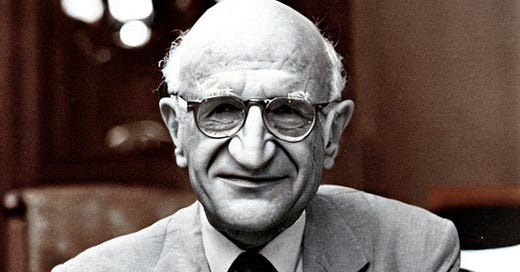Milton Friedman: Champion of Free Markets and Individual Freedom
Exploring the Life and Legacy of a Revolutionary Economist and Political Thinker.
Milton Friedman was an American economist, statistician, and author who is widely regarded as one of the most influential champions of free markets and individual freedom in the 20th century. Born in New York City in 1912, Friedman's work has had a profound impact on modern economic theory and policymaking, both in the United States and around the world.
Friedman's contributions to economics were many and varied, but perhaps his most significant contribution was his advocacy of monetarism, a theory which posits that changes in the money supply have a profound impact on economic growth and inflation. This theory challenged the prevailing Keynesian economic orthodoxy of the time, which held that government intervention was necessary to manage the economy.
Friedman's work also emphasized the importance of individual freedom and limited government. He argued that government intervention in the economy often led to unintended consequences and that individuals were better equipped to make their own economic decisions than bureaucrats. This philosophy underpinned his advocacy of free market capitalism, which he believed was the best way to promote economic growth and prosperity.
Friedman was a prolific author, publishing dozens of books and articles throughout his career. Among his most famous works are "Capitalism and Freedom," which argued that economic freedom and political freedom were intimately linked, and "A Monetary History of the United States," which explored the role of the money supply in shaping the American economy.
Friedman was also a prominent public figure, appearing on television and in the media to discuss economic issues and advocate for his beliefs. He was a frequent contributor to the editorial pages of major newspapers, and he served as an advisor to several U.S. presidents, including Richard Nixon and Ronald Reagan.
Today, Friedman's ideas continue to shape economic policymaking around the world. His advocacy of free market capitalism has influenced politicians and policymakers in countries as diverse as Chile, China, and the United Kingdom, and his work on monetarism has led to changes in the way that central banks manage the money supply.
Other economists and political thinkers have also championed similar ideas to Friedman. Friedrich Hayek, for example, was a prominent Austrian economist who advocated for free market capitalism and limited government. Ayn Rand, a Russian-American philosopher, also argued for individual freedom and laissez-faire capitalism. And James M. Buchanan, an American economist, was a pioneer in the field of public choice theory, which explored how individuals and interest groups shape government policy.
Milton Friedman was a highly influential economist whose ideas have had a profound impact on modern economic theory and policymaking. His advocacy of monetarism and free market capitalism challenged prevailing economic orthodoxy and emphasized the importance of individual freedom and limited government. Friedman's work has influenced policymakers in countries around the world and continues to shape economic policy today. As a prolific author and public figure, he made significant contributions to the field of economics and inspired many to consider the benefits of free markets and individual liberty. Friedman's legacy serves as a reminder of the importance of economic freedom and its ability to promote prosperity and opportunity.
Discover a world of possibilities at macksie.com!






